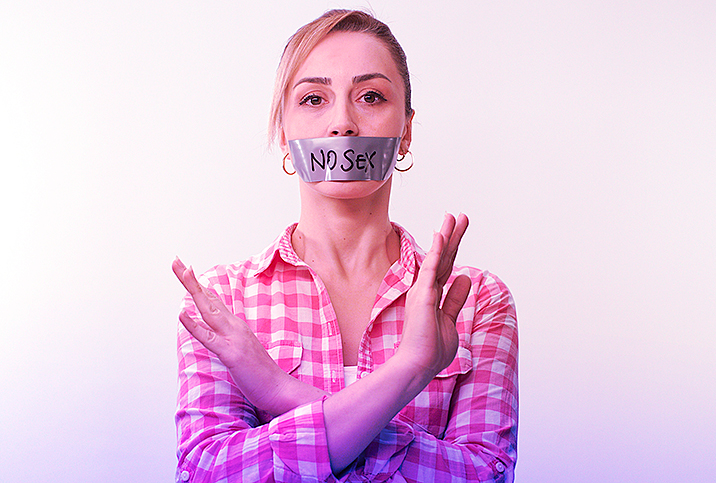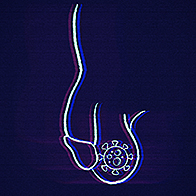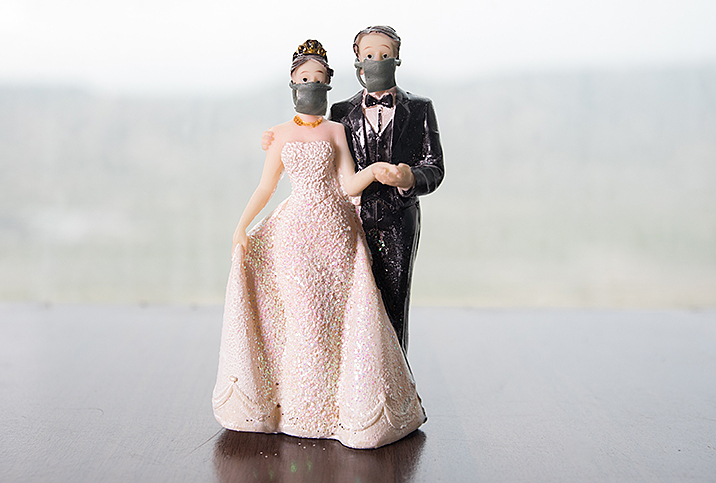Is COVID-19 Causing a Rise in Cases of Sexual Aversion?

"To be honest, I usually can't stomach the thought of having sex anymore. It's literally the last thing I would want to do," said Carey, a 34-year-old publicist from San Francisco. She's been happily married for six years, but for the past year or so, she's been feeling—well—pretty ambivalent toward the idea of having sex. "I don't know if it started when we were both working from home or what....All I know is that I find it really, really hard to get excited anymore."
If you know anything about sexual disorders, you may recognize what Carey is describing as sexual aversion. The Diagnostic and Statistical Manual of Mental Disorders defines sexual aversion disorder as the "persistent or recurrent extreme aversion to, and avoidance of, all or almost all, genital sexual contact with a sexual partner." With a case of sexual aversion, it goes beyond having a low libido. The disorder can also result in panic attacks, anxiety, dizziness, heart palpitations or even nausea.
Carey isn't the only person experiencing unexplained feelings of revulsion toward the idea of sex since the pandemic began. Research from around the world has shown that sexual desire and satisfaction dramatically decreased in 2020. Has COVID caused an epidemic of sexual aversion in the bedroom?
According to a 2021 study by Texas State University, desire initially spiked when the pandemic hit, but once the stress and fatigue set in, sexual desire decreased. As Houston-based sex therapist Emily Jamea told the BBC in response to this study, this was linked to the effect of stress on the body.
"If there's a massive threat right there, that sends a signal to our bodies that now's probably not a good time to have sex," she said. She goes on to explain, "Heightened stress leads to low desire or difficulty with arousal."
'Anytime we are extra stressed, the desire for sex drops.'
In the 2021 article "Uncertainty, Sex and Sexuality During the Pandemic: Impact on Psychosocial Resilience," authors Debanjan Banerjee, Sanchari Mukhopadhyay, Abhinav Tandon and T.S. Sathyanarayana Rao explained that it was natural for sexual aversion to develop during times of stress.
"While for some individuals, the need for 'social touch' and intimacy are vital to cope, in others, the moral underpinnings about mortality, grief and death anxiety can lead to sexual aversion," they wrote.
Jennifer Lincoln, medical advisor to The Body Agency, said the pandemic created the perfect environment for sexual aversion to develop.
"Anytime we are extra stressed, the desire for sex drops," she said. "In addition to 'just' being worried about COVID, there's the extra stress of kids being home, work schedule disruptions, inflation, supply chain issues—you name it, they're taking up more space in our brain and making it harder for us to relax and be receptive to sex."
Of course, this is hardly a universal trend. While there has been an increased number of people experiencing lower levels of sexual desire and even developing sexual aversion, for others, the pandemic has actually had the opposite effect.
"Some have found the flexibility of working from home and the proximity to their partners has actually enhanced their sex lives," Lincoln said. "It's definitely not one size fits all."
Edwina Cairo, a sex toy reviewer and sexual health writer for Bedbible, said many companies reported increased sales in sex toys.
"Adam and Eve reported a 30 percent increase in sales, while companies like Wow Tech Group, the makers of We Vibe (a long-distance, app-enabled sex toy), and the Womanizer, reported that their sales climbed 200 percent in April of 2020 in comparison to the year before," Cairo said. Evidently, many people not only experienced higher levels of sexual desire, but they also became interested in trying new ways of experiencing sexual pleasure.
It's evident the pandemic has had a dramatic effect on our sex lives and on our personal feelings toward sex. For some of us, it may have increased levels of sexual desire and even made us interested in trying new things in the bedroom. For others, however, the stress of the pandemic created a fight-or-flight response in the body that has led to a lower libido and even cases of sexual aversion.




















